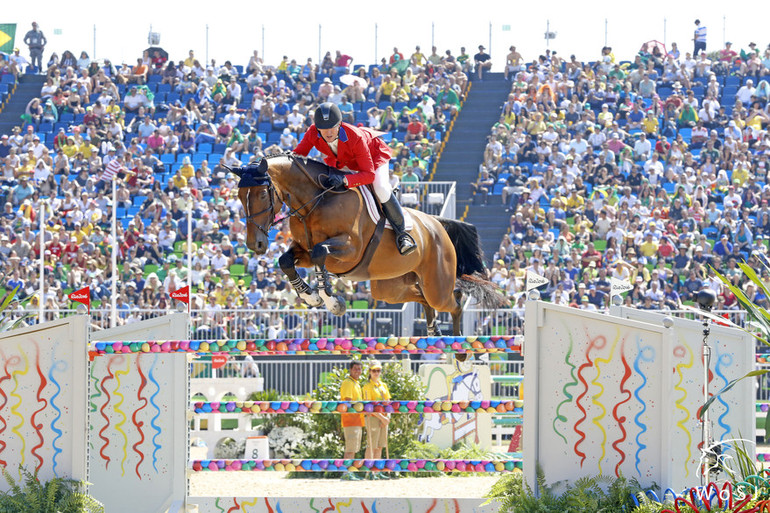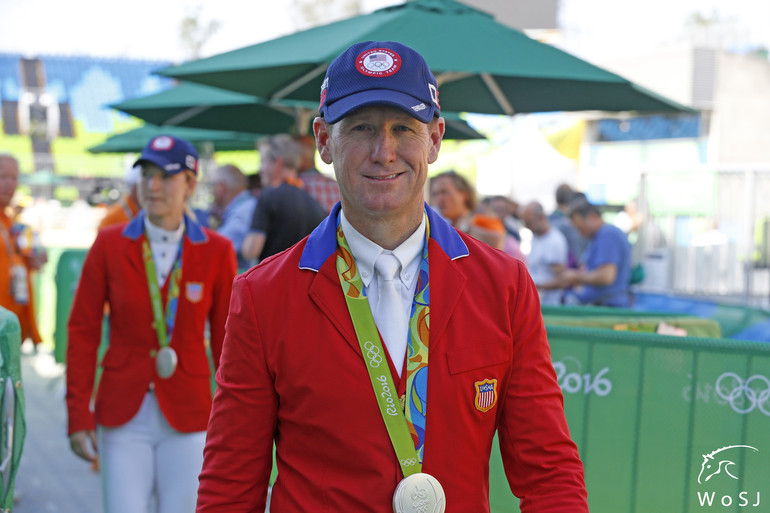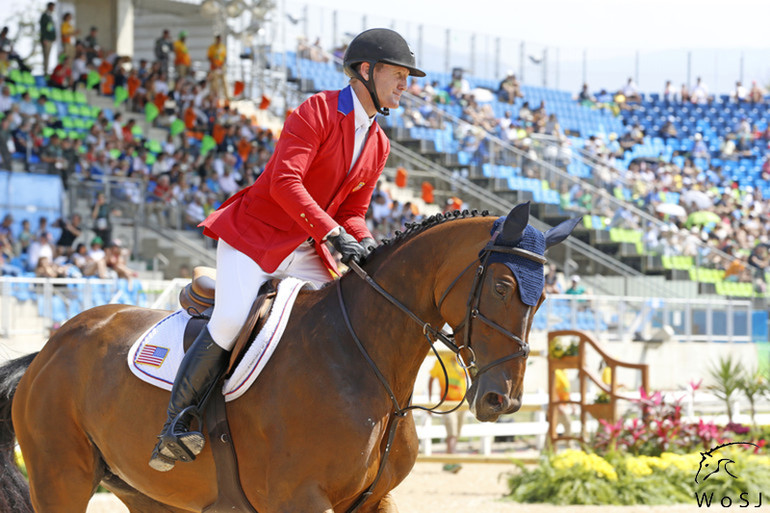 "The base philosophy for our team is that we’re going to prepare and we’re going to compete as if everything was going to go, and if it doesn’t, we’ll make an adjustment accordingly," Mclain Ward – here seen with HH Azur – says about preparing for the Olympic Games in a time when it seems almost impossible to make plans. Photo © Jenny Abrahamsson for World of Showjumping.
"The base philosophy for our team is that we’re going to prepare and we’re going to compete as if everything was going to go, and if it doesn’t, we’ll make an adjustment accordingly," Mclain Ward – here seen with HH Azur – says about preparing for the Olympic Games in a time when it seems almost impossible to make plans. Photo © Jenny Abrahamsson for World of Showjumping.
Text by Erin Gilmore for World of Showjumping
For a man who prides himself on operating by a specific plan, the last 12 months have been as challenging for Mclain Ward as for anyone else. But Mclain, an Olympic and World Cup champion who is unquestionably one of the USA’s most decorated riders, has gotten better about facing the unexpected. Amid fits and starts (Mclain was planning to attend the 2021 FEI World Cup Jumping Final right up until it was canceled due to the EHV-1 outbreak in Europe) he is moving through each day as if every goal is steady on the horizon. 2020 was a learning year in countless ways, and as the ultimate goal of selection for Tokyo Olympics draws closer, we sat down with the 45-year-old Team USA veteran to talk prospects, making a plan, and his perspective on topics that have touched equestrian sport in the last year.
World of Showjumping: Who are you looking at as your top horses for this year?
Mclain Ward: At the moment I have Contagious, HH Azur, and I was also lucky enough to add Kasper van het Hellehof from the Moffitt-family, which was a great addition to the team and a horse that I think has a great future.
Covid, for a lot of the horses, changed some things. Azur is now a year older, and as Clinta has been out I’m working on bringing her back. So I had it in the back of my mind that maybe Contagious was an (Olympic) option for this year, and I would try and let it play out. So I have him, and Azur, and Azur we’ve been very careful with; we know what she is and we’re just slowly trying to build up to the summer. And Contagious has just come on gangbusters.
With Azur and Contagious, I’m doing everything I can to be best prepared with both horses for a possible Olympics Games, and whichever horse is in the best form – I’d love to have the opportunity to go to Tokyo with.
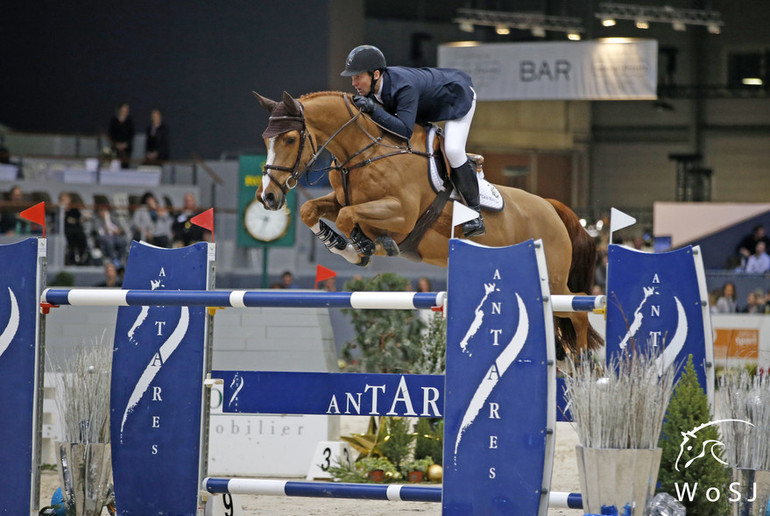 "With Azur and Contagious, I’m doing everything I can to be best prepared with both horses for a possible Olympics Games, and whichever horse is in the best form – I’d love to have the opportunity to go to Tokyo with," Mclain Ward tells – here pictured with Contagious. Photo © Jenny Abrahamsson for World of Showjumping.
"With Azur and Contagious, I’m doing everything I can to be best prepared with both horses for a possible Olympics Games, and whichever horse is in the best form – I’d love to have the opportunity to go to Tokyo with," Mclain Ward tells – here pictured with Contagious. Photo © Jenny Abrahamsson for World of Showjumping.
World of Showjumping: Can I even ask you about a plan for this year, given the atmosphere where it still feels impossible to make a plan?
Mclain Ward: Frankly, it’s really difficult. And it’s particularly difficult for myself, who prides themselves and works out of a plan all the time. I know a year down the road, I have an idea of two years down the road, six months and a month to the day and to the hour. I work well in that environment and in this, you have to be fluid.
I’m also mapping out a plan for my students Lillie Keenan and Adrienne Sternlicht and to some degree for Lucy Deslauriers, and it’s a lot of factors, it’s a lot of targets you can’t see. You have to be flexible and you have to have trust in your team that something will work out. The base philosophy for our team is that we’re going to prepare and we’re going to compete as if everything was going to go, and if it doesn’t, we’ll make an adjustment accordingly.
You have to be flexible and you have to have trust in your team that something will work out.
World of Showjumping: What kind of an Olympics do you think we are staring down right now, given the uncertainty? If everything does go to plan, are we even looking at a normal Olympics?
Mclain Ward: Well the environment is going to be different, just as the same as it would have been at the World Cup Finals. You’re not going to have an audience, there’s going to be less atmosphere. I’ve been blessed to have things work out to have gone to four Olympics, and I know that we’re in a bubble at the Olympics anyway, we go in and we have a job to do. It’s not a tourist experience.
The leading reason for athletes’ poor performances in an Olympic Games is normally attributed to outside obligations that they get distracted by. So the idea that we’re in a little bit of a cocoon is normal. I would say in the ring, we don’t really feel the audience anyway in the moment. And for some of the horses that might be a little easier of an environment, to be frank.
World of Showjumping: What about format wise - i.e. how do you handle the process leading up to the new championship format of an Olympic Games without the same preparation you’ve had in years past?
Mclain Ward: I look at it in the same way we’ve looked at this Covid year leading up to now. This is what it is, and that’s the challenge in front of us. It’s wasted energy to say ‘well we wish it was this way.’ I think that with the individual (Olympic rounds) going first, it will suit some horses better, and for those who need more rounds to get going, it will suit less. So, it’s a different test, it has a different dynamic to it, but it’s not a surprise.
All the US riders who are (Olympic) candidates have been preparing for what their situations are. If you look at the top ten or 15 people who could be shortlisted, we’ve got a pretty wide range of people and experiences, horse ages and experiences. I always trust that in the right moment it comes together because of people trying their best in the right ways.
I always trust that in the right moment it comes together because of people trying their best in the right ways.
World of Showjumping: This year’s Winter Equestrian Festival must have felt like a return to some sort of normalcy. How has it been to be able to return to some consistency in showing and training?
Mclain Ward: We’re blessed compared to most of the world. The setup in Florida works better than anywhere in the world. Most people have some sort of permanent residence or somewhere they can retreat to comfortably. Most of us have farms so we can get off the horse show grounds. Management here has worked really hard to keep this up and running, and it’s come off without a major hitch, and allowed us to compete and have a sport.
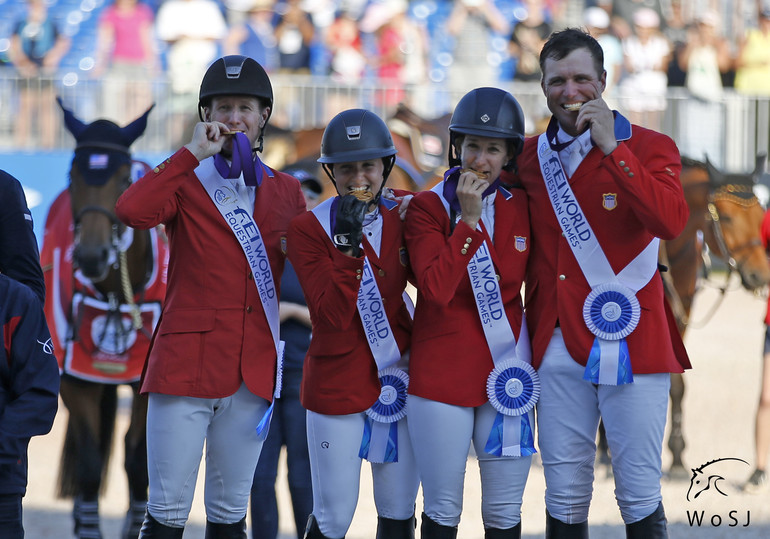 "I always trust that in the right moment it comes together because of people trying their best in the right ways," Mclain Ward says – here seen celebrating team gold at the World Equestrian Games in Tryon in 2018 with Adrienne Sternlicht, Laura Kraut and Devin Ryan. Photo © Jenny Abrahamsson for World of Showjumping.
"I always trust that in the right moment it comes together because of people trying their best in the right ways," Mclain Ward says – here seen celebrating team gold at the World Equestrian Games in Tryon in 2018 with Adrienne Sternlicht, Laura Kraut and Devin Ryan. Photo © Jenny Abrahamsson for World of Showjumping.
World of Showjumping: Changing the subject a bit. As a team rider, you personally are the target market for top level USEF competition. At the other end of the spectrum there is the low-level amateur who is the target market for an affordable horse show product. Is there room in the sport for both groups, and is the opening of the World Equestrian Center in Ocala, which held competitions that cost less to participate in, under a different US national federation (the National Snaffle Bit Association rather than US Equestrian Federation) helping the sport by providing the latter?
Mclain Ward: I think that the economics of this sport are a massive challenge. I don’t think that there is anybody on any professional level, let alone anyone on the amateur or young rider level, that wants the sport to be more expensive. Particularly over the last 20 years, the sport and industry have taken off. From price of competing, to running a horse shipping company, or producing equipment – everything has skyrocketed. And it’s created an incredibly robust economy, but as with anything that grows that fast, there’s collateral damage. And the collateral damage that we all find frustrating is that people aren’t able to participate.
There are people like me who would love to have two or three people working under me as riders, but I can’t afford to pay their housing and car and salary, plus $6,000 a week in entry fees for other people to make mistakes when I might as well do it myself. It just becomes a bad economic model.
You continue on down the line, to people who have a couple of horses wanting to go to a show but it costs $1,000 a week, that’s a huge problem. So any effort, any effort to make the sport more affordable, more inclusive, more friendly, I think is in a positive direction.
So any effort, any effort to make the sport more affordable, more inclusive, more friendly, I think is in a positive direction.
We do have to balance that with having a sport with a governing body, a federation, and a process of running events, having rules. It can’t be just anybody can do whatever they want.
I never want to take away from the economy of the sport and growth is great. But I think the two need to be addressed. If we don’t have a wider swath of participation at the grassroots level, the funnel gets smaller at the top. If you look at other sports – when people can do it at some level, they associate with that sport and the sport then has a wider fanbase. Golf grew at the grassroots level due to massive efforts; in part due to efforts in diversity with Tiger Woods being such a star and bringing a whole different group of people to the sport. It’s grown massively at the grassroots level and people can participate in the sport to some degree.
So we need to look at some of those frameworks but we also need a governing body that manages production of the events, and take everybody’s needs at different levels and do it right. What’s happening at the center in Ocala, they have the facility and the financial situation to really see it through, and so we’re going to see real progress hopefully in the right direction.
World of Showjumping: After the social justice movement took off last June in the USA and around the world, you put out some really meaningful statements on the topic of inclusivity in show jumping. Do you think we as equestrians have succeeded in opening the doors to our sport?
Mclain Ward: I think that we’ve opened that door in our minds, but not enough in practice. The idea is there, but going back to some of the more controversial articles and statements last year, I don’t find that the horse community is in any way really a racist community or a bigoted community, it’s somewhat of an economic exclusivity, which in turn trickles down to shutting out people from different ethnic and financial backgrounds. The two tie together. It’s not that most people at the forefront of this business look at minorities negatively.
One thing that really hit me when the conversation started to take place was this: when I see someone competing at a show, or work with someone of a different ethnic or religious background than myself, I never look at that person as being somebody different. I see them and think are you nice, are you not nice, do you work hard, etc. But the point that was brought up to me was, how do they feel? How do they see it?
Because if I see an African American person at a show, I never give it a second thought. But if there are only five of them, and 5,000 Caucasian white males, they see the environment differently. That opened my eyes. This needs to not only be a more welcoming community, there needs to be a lot more outreach on all levels.
My daughters are lucky they’re going to get to grow up on a place with horses and donkeys and cows, and I notice what an opportunity that is. They are learning empathy, care, responsibility, and I don’t take that for granted. Those are a lot of the important things that come when we have outreach programs.
Can we make it a better community, can we touch more people’s lives? Absolutely.
World of Showjumping: As a figure at the top of the sport, do you feel responsible to take action to support that effort?
Mclain Ward: In our minds, I think we all want to support the effort, but in putting it into practice, we are a long way from being successful.
It takes a lot of people in between to facilitate that effort. For myself, I’m overseeing 40 horses, I’m trying to go to the Olympic Games, I’m trying to get three other students to the Olympic Games, oh by the way I have two daughters, there are a lot of balls in the air. But I have had some great conversations with people who are facilitating. Help me set something up, and I’ll be there. Whether it’s a talk, a meet and greet, or an opportunity to come to the farm, I’m open to it.
I think generally, we’re a pretty good group of people. We have our faults. When people ask me what I want to be remembered for I always say, ‘I wasn’t perfect but I tried harder each day.’ We all have to realize that we have faults, we have shortcomings, and we’re going to make mistakes. Sometimes we’re misjudged, but the general sentiment is that we’re a good community at its core. Can we make it a better community, can we touch more people’s lives? Absolutely.
No reproduction without written permission, copyright © World of Showjumping.com



